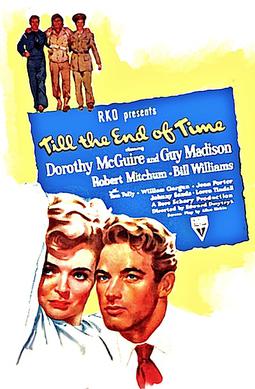“Till the End of Time” was directed by Edward Dmytryk. In 1947, he was nominated for an Academy Award for Best Director for the movie “Crossfire”. Soon after, he was caught up in the Red Scare. As part of the famous “Hollywood Ten”, he refused to testify before the House Un-American Activities Committee. He had briefly been in the Communist Party in 1944-45. He was declared in contempt of Congress and sentenced to prison. He was fired by RKO, the studio he had made the film for. Escaping to Great Britain, he was unofficially ostracized, making only a few B-movies. Returning to America in 1951 when his passport expired, he was sent to prison for over four months. Upon release he agreed to testify before the HUAC. He named names, including other directors. He claimed that some Hollywood executives pressured him to include communist themes in some of his movies. Hollywood forgave him and he went on to make several war movies including “The Caine Mutiny”, “The Young Lions”, “Alvarez Kelly”, and “Anzio”. “Till the End of Time” came out before, but the same year as, the similar "The Best Years of Our Lives”. It did well at the box office but was overshadowed by the multi-Oscar winner. It was based on the novel “They Dream of Home” by Niven Busch. The title was changed to take advantage of the song by Perry Como which was #1 for ten weeks. The song’s music is Frederic Chopin’s Polonaise Opus 53, which can be heard throughout the movie.
Harper (Guy Madison) is a decorated Marine coming home after 3 ½ years in the Pacific. He’s still a private. That oddity is not explained. We go from “The Marine Corps Hymn” to “How Sweet Home” as Harper and his buddy Tabeshaw (Robert Mitchum) gets discharged. Harper is bitter because he lost 3 ½ years of his life. As soon as he gets home, he is pursued by a teenybopper named Helen (Jean Porter), but he is in an on again / off again relationship with Pat (Dorothy McGuire). Helen is like Lt. Pell (Robert Wagner in “The Hunters”), she’s hip, dude. But while Pell was a fish out of water (but a hilarious one), Helen’s slang is appropriate for a movie released in 1946. A theme of the movie is the various postwar experiences of returning vets. Harper is friends with Sgt. Kincheloe who lost his legs. He was a boxer and is bitter because of his lost future as Harper is bitter about his lost past. He has trouble adjusting to civilian life. The third arc is that of Tabeshaw. He deals with his PTSD by gambling. He’s having headaches, but doesn’t want a doctor. There were definitely veterans in the theaters who could empathize with the three. The trio encounter the “American War Patriots”, which tries to recruit them. The organization (which is fictional, but stands in for right wing groups) is anti-Catholic, anti-Jew, and anti-“negroes”. The movie climaxes with a bar fight with the ass holes.
Naturally, the movie has been compared to “The Best Years of Our Lives”. They have similar themes, but this movie concentrates on one of the trio. In this case, it’s Harper. His relationship with Pat is interesting because it is not predictable. Pat is a good character. She’s not just there to be wooed. The cast is a strength. Madison was a rising star who had been given a contract by David O. Selznick based purely on his handsomeness.. Unfortunately, his good looks did not equate to good acting. He did score on TV playing Wild Bill Hickok. He continued to make movies and after the series’ seven year run, he went to Europe where he became the has-been American actor in spaghetti westerns, macaroni combat, and swords-and-sandals movies. Although Mitchum had appeared in many movies before this one, he is second-billed. He was one year away from “The Story of G.I. Joe ”. He overshadows Madison. No surprise there.
“Till the End of Time” is a sincere effort to bring attention to problems veterans faced. It also has a message to the veterans. You can do it! It also pays some attention to the problems parents had in dealing with their sons when they came home from war with PTSD. It is not as good as “Best Years”, but it is not bad.
GRADE = B-

No comments:
Post a Comment
Please fell free to comment. I would love to hear what you think and will respond.